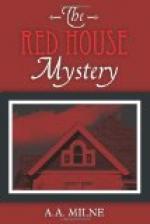“And stopped to listen?”
“Certainly not,” said Elsie with dignity, feeling that nobody really understood her. “I was just passing through the hall, just as you might have been yourself, and not supposing they was talking secrets, didn’t think to stop my ears, as no doubt I ought to have done.” And she sniffed slightly.
“Come, come,” said the Inspector soothingly, “I didn’t mean to suggest—”
“Everyone is very unkind to me,” said Elsie between sniffs, “and there’s that poor man lying dead there, and sorry they’d have been, if it had been me, to have spoken to me as they have done this day.”
“Nonsense, we’re going to be very proud of you. I shouldn’t be surprised if your evidence were of very great importance. Now then, what was it you heard? Try to remember the exact words.”
Something about working in a passage, thought Elsie.
“Yes, but who said it?”
“Mr. Robert.”
“How do you know it was Mr. Robert? Had you heard his voice before?”
“I don’t take it upon myself to say that I had had any acquaintance with Mr. Robert, but seeing that it wasn’t Mr. Mark, nor yet Mr. Cayley, nor any other of the gentlemen, and Miss Stevens had shown Mr. Robert into the office not five minutes before—”
“Quite so,” said the Inspector hurriedly. “Mr. Robert, undoubtedly. Working in a passage?”
“That was what it sounded like, sir.”
“H’m. Working a passage over—could that have been it?”
“That’s right, sir,” said Elsie eagerly. “He’d worked his passage over.”
“Well?”
“And then Mr. Mark said loudly—sort of triumphant-like—’It’s my turn now. You wait.’”
“Triumphantly?”
“As much as to say his chance had come.”
“And that’s all you heard?”
“That’s all, sir—not standing there listening, but just passing through the hall, as it might be any time.”
“Yes. Well, that’s really very important, Elsie. Thank you.”
Elsie gave him a smile, and returned eagerly to the kitchen. She was ready for Mrs. Stevens or anybody now.
Meanwhile Antony had been exploring a little on his own. There was a point which was puzzling him. He went through the hall to the front of the house and stood at the open door, looking out on to the drive. He and Cayley had run round the house to the left. Surely it would have been quicker to have run round to the right? The front door was not in the middle of the house, it was to the end. Undoubtedly they went the longest way round. But perhaps there was something in the way, if one went to the right—a wall, say. He strolled off in that direction, followed a path round the house and came in sight of the office windows. Quite simple, and about half the distance of the other way. He went on a little farther, and came to a door, just beyond the broken-in windows. It opened easily, and he found himself in a passage. At the end of the passage was another door. He opened it and found himself in the hall again.




